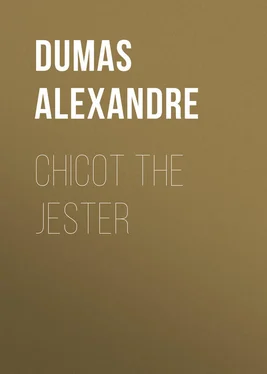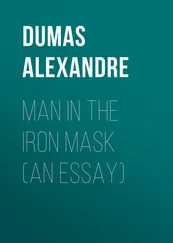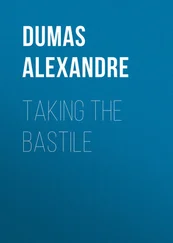Alexandre Dumas - Chicot the Jester
Здесь есть возможность читать онлайн «Alexandre Dumas - Chicot the Jester» — ознакомительный отрывок электронной книги совершенно бесплатно, а после прочтения отрывка купить полную версию. В некоторых случаях можно слушать аудио, скачать через торрент в формате fb2 и присутствует краткое содержание. Жанр: literature_19, foreign_antique, foreign_prose, на английском языке. Описание произведения, (предисловие) а так же отзывы посетителей доступны на портале библиотеки ЛибКат.
- Название:Chicot the Jester
- Автор:
- Жанр:
- Год:неизвестен
- ISBN:нет данных
- Рейтинг книги:5 / 5. Голосов: 1
-
Избранное:Добавить в избранное
- Отзывы:
-
Ваша оценка:
- 100
- 1
- 2
- 3
- 4
- 5
Chicot the Jester: краткое содержание, описание и аннотация
Предлагаем к чтению аннотацию, описание, краткое содержание или предисловие (зависит от того, что написал сам автор книги «Chicot the Jester»). Если вы не нашли необходимую информацию о книге — напишите в комментариях, мы постараемся отыскать её.
Chicot the Jester — читать онлайн ознакомительный отрывок
Ниже представлен текст книги, разбитый по страницам. Система сохранения места последней прочитанной страницы, позволяет с удобством читать онлайн бесплатно книгу «Chicot the Jester», без необходимости каждый раз заново искать на чём Вы остановились. Поставьте закладку, и сможете в любой момент перейти на страницу, на которой закончили чтение.
Интервал:
Закладка:
“Then the little troop went away, and we went up the stairs of our house, and found ourselves in a corridor. Three doors were open; we entered the middle one, and found ourselves in the room where we now stand. On opening the door of my bedroom, to my great astonishment I found my own portrait there. It was one which had hung at Méridor, and the count had doubtless begged it of my father. I trembled at this new proof that my father regarded me already as his wife.
“Nothing was wanting in the room; a fire burned in the grate, and a supper was ready in the sitting-room. I saw with satisfaction that it was laid for one only, and yet when Gertrude said, ‘Well, mademoiselle, you see the count keeps his promises.’ – ‘Alas! yes,’ replied I with a sigh, for I should have preferred that by breaking his word he should have given me an excuse to break mine. After supper, we examined the house, but found no one in it. The next day Gertrude went out, and from her I learned that we were at the end of the Rue St. Antoine, near the Bastile. That evening, as we were sitting down to supper, some one knocked. I grew pale.
“‘If it be the count?’ asked Gertrude. ‘You must open to him; he has kept his promises, and I must keep mine.’ A moment after he entered. ‘Well, madame,’ said he, ‘have I kept my word?’ ‘Yes, monsieur, and I thank you for it.’ ‘Then you will receive me?’ said he, with an ironical smile. ‘Enter, monsieur,’ said I, ‘have you any news?’ ‘Of what, madame?’ ‘Of my father, firstly?’ ‘I have not been to Méridor and have not seen the baron.’ ‘Then of Beaugé, and the Duc d’Anjou?’ ‘I have been to Beaugé, and have spoken to the duke.’ ‘What does he say?’ ‘He appears to doubt.’ ‘Of what?’ ‘Of your death.’ ‘But you confirmed it?’ ‘I did all I could.’ ‘Where is the duke?’ I then asked. ‘He returned to Paris yesterday. One does not like to stay in a place where one has the death of a woman to reproach one’s self with.’ ‘Have you seen him in Paris?’ ‘I have just left him.’ ‘Did he speak of me?’ ‘I did not give him time; I spoke incessantly of a promise which he made to me.’ ‘What is it?’ ‘He promised me as a reward for services rendered to him, to make, me chief huntsman.’ ‘Ah, yes,’ said I, thinking of my poor Daphné ‘you are a terrible hunter, I know.’ ‘It is not for, that reason I obtain it, but the duke dare not be ungrateful to me.’
“‘Can I write to my father?’ said I. ‘Doubtless; but your letters may be intercepted.’ ‘Am I forbidden to go out?’ ‘Nothing is forbidden; but I beg to point out to you that you may be followed.’ ‘At least I must go on Sunday to mass.’ ‘It would be better not; but if you do, I advise you to go to St. Catherine.’ ‘Where is that?’ ‘Just opposite you.’ There was a silence. Then I said, ‘When shall I see you again, monsieur?’ ‘When I have your permission to come.’ ‘Do you need it?’ ‘Certainly, as yet I am a stranger to you.’ ‘Monsieur,’ said I, half frightened at this unnatural submission, ‘you can return when you like, or when you think you have anything important to communicate.’
“‘Thanks, madame,’ said he, ‘I will use your permission, but not abuse it. I know you do not love me, and I will not abuse a situation which forces you to receive me. You will, I trust, gradually become accustomed to the thought, and be willing, when the moment shall arrive, to become my wife.’ ‘Monsieur,’ said I, ‘I appreciate your delicacy and frankness. I will use the same frankness. I had a prejudice against you, which I trust that time will cure.’ ‘Permit me,’ said he, ‘to partake this anticipation and live in the hopes of that happy moment.’ Then bowing respectfully, he went out.”
CHAPTER XV.
THE MARRIAGE
“A strange man,” said Bussy.
“Yes, is he not, monsieur? When he was gone I felt sadder and more frightened than ever. This icy respect, this ironical obedience, this repressed passion, which now and then showed itself in his voice, frightened me more than a will firmly expressed, and which I could have opposed, would have done. The next day was Sunday; I had never in my life missed divine service, so I took a thick veil and went to St. Catherine’s, followed by Gertrude, and no one seemed to remark us.
“The next day the count came to announce to me that the duke had fulfilled his promise, and had obtained for him the place of chief huntsman, which had been promised to M. de St. Luc. A week passed thus: the count came twice to see me, and always preserved the same cold and submissive manner. The next Sunday I went again to the church. Imprudently, in the midst of my prayers, I raised my veil. I was praying earnestly for my father, when Gertrude touched me on the arm. I raised my head, and saw with terror M. le Duc d’Anjou leaning against the column, and looking earnestly at me. A man stood by him.”
“It was Aurilly,” said Bussy.
“Yes, that was the name that Gertrude told me afterwards. I drew my veil quickly over my face, but it was too late: he had seen me, and if he had not recognized me, at least my resemblance to her whom he believed dead had struck him. Uneasy, I left the church, but found him standing at the door and he offered to me the holy water as I passed. I feigned not to see him, and went on. We soon discovered that we were followed. Had I known anything of Paris, I would have attempted to lead them wrong, but I knew no more of it than from the church to the house, nor did I know any one of whom I could ask a quarter of an hour’s hospitality; not a friend, and only one protector, whom I feared more than an enemy.”
“Oh! mon Dieu!” cried Bussy, “why did not Heaven, or chance, throw me sooner in your path?”
Diana thanked the young man with a look.
“But pray go on,” said Bussy, “I interrupt you, and yet I am dying to hear more.”
“That evening M. de Monsoreau came. I did not know whether to tell him of what had happened, but he began, ‘You asked me if you could go to mass, and I told you you were free, but that it would be better not to do so. You would not believe me: you went this morning to St. Catherine’s, and by a fatality the prince was there and saw you.’ ‘It is true, monsieur; but I do not know if he recognized me.’ ‘Your face struck him; your resemblance to the woman he regrets appeared to him extraordinary, he followed you home, and made inquiries, but learned nothing, for no one knew anything.’ ‘Mon Dieu!’ cried I. ‘The duke is persevering,’ said he. ‘Oh! he will forget me, I hope.’
“‘No one forgets you who has once seen you,’ said he. ‘I did all I could to forget you, and I have not succeeded.’ And the first passionate look that I had seen flashed from the eyes of the count. I was more terrified by it than I had been by the sight of the prince. I remained mute. ‘What will you do?’ asked the count. ‘Can I not change my abode – go to the other end of Paris, or, better still, return to Anjou?’ ‘It will be useless; the duke is a terrible bloodhound, and now he is on your track, he will follow you wherever you go till he finds you.’ ‘Oh! mon Dieu! you frighten me.’ ‘I tell you the simple truth.’ ‘Then what do you advise me to do?’ ‘Alas!’ said he, with a bitter irony. ‘I am a man of poor imagination. I had formed a plan, but it does not suit you; I can find no other.’ ‘But the danger is perhaps less pressing than you imagine.’
“‘The future will show us, madame,’ said the count, rising. ‘I can but add that the Comtesse de Monsoreau would have the less to fear from the prince, as my new post places me under the direct protection of the court.’ I only replied by a sigh. He smiled bitterly, and as he went down-stairs I heard him giving vent to oaths. The next day, when Gertrude went out, she was accosted by a young man whom she recognized as the one who had accompanied the prince, but she remained obstinately silent to all his questions. This meeting inspired me with profound terror; I feared that M. de Monsoreau would not come, and that they would invade the house in his absence. I sent for him, he came at once. I told him all about the young man, whom I described.
Читать дальшеИнтервал:
Закладка:
Похожие книги на «Chicot the Jester»
Представляем Вашему вниманию похожие книги на «Chicot the Jester» списком для выбора. Мы отобрали схожую по названию и смыслу литературу в надежде предоставить читателям больше вариантов отыскать новые, интересные, ещё непрочитанные произведения.
Обсуждение, отзывы о книге «Chicot the Jester» и просто собственные мнения читателей. Оставьте ваши комментарии, напишите, что Вы думаете о произведении, его смысле или главных героях. Укажите что конкретно понравилось, а что нет, и почему Вы так считаете.












